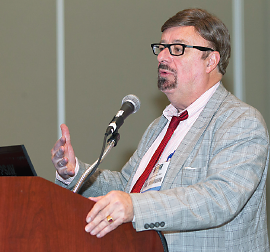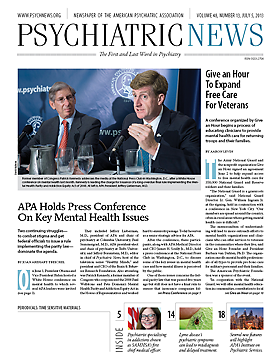“Some delusions deserve pharmacotherapy, and some do not,” said George Grossberg, M.D., about the use of antipsychotic medications in patients with dementia. Grossberg spoke at the session “Advances in Geriatric Psychopharmacology” at APA’s 2013 annual meeting in San Francisco in May. He is the Samuel W. Fordyce Professor of Psychiatry and director of geriatric psychiatry at Saint Louis University School of Medicine. He has spent much of his career furthering the understanding of behavioral symptoms in Alzheimer’s disease and other neurocognitive disorders.
In his presentation on psychotic disorders in the elderly, Grossberg addressed the nature and treatment of delusions that occur as part of the psychosis of Alzheimer’s disease and those that occur in non-Alzheimer’s dementias.
“Most of these delusions are fairly simple,” he explained, such as those in which the patient believes he or she is in the wrong home or that those around them are stealing their belongings. Grossberg said these patients often have delusions of misidentification or misperception. The complexity of their delusions decreases with increased cognitive impairment, but some delusions may trigger agitation.
Hallucinations are also associated with dementia, with visual hallucinations being most common, such as those that include people from the patient’s past or the presence of animals or intruders. Auditory hallucinations also occur, but are usually simple, such as hearing voices from a deceased relative, and are rarely persecutory, said Grossberg. Patients with advanced dementia may experience visual hallucinations that cause them to reach out to touch imaginary objects. And hallucinations, like delusions, may trigger agitation in some patients.
In such patients, Grossberg recommends carefully evaluating and treating any underlying medical problems, considering possible offending medications, and identifying environmental and psychosocial triggers that might be able to be altered for the patient.
When considering treatment with antipsychotics for patients who do not respond to such nonpharmacologic measures, Grossberg recommended discussing the risks and benefits of using antipsychotics in dementia with the patient’s family, if possible, and documenting that conversation.
“We have to ask ourselves whether a patient’s delusions are disabling, do they pose a safety risk, or do they cause severe emotional distress?” he said, noting that the goal of antipsychotic therapy in these aging patients must be to minimize their agitation and distress and decrease behaviors that could be dangerous to themselves or others.
“We don’t want to be too liberal in prescribing these medications,” said Grossberg, who also discussed the implications of recent efforts to address the use of antipsychotics in elderly patients through federal regulation. “We want to be sure in this older, vulnerable audience that the indications are proper, and the psychotic symptoms are really disabling. On the other hand, we don’t want to deny [treatment for] individuals who could dramatically benefit from these medications. It’s important for us to better understand the nature of behavioral symptoms in Alzheimer’s disease and related disorders and to understand the nonpharmacologic treatment options that are available, but also to appreciate what appropriate pharmacological treatment can do for these patients.” ■

